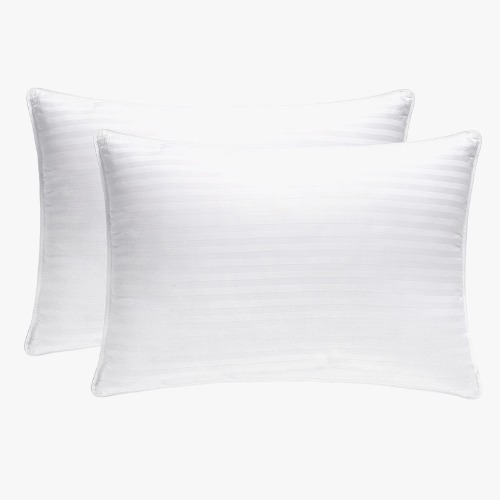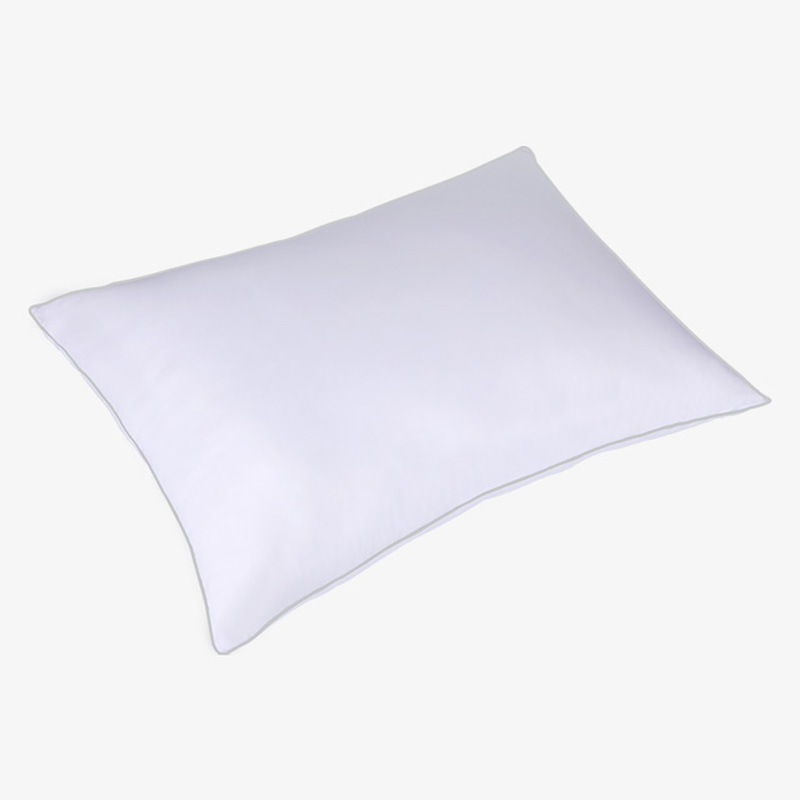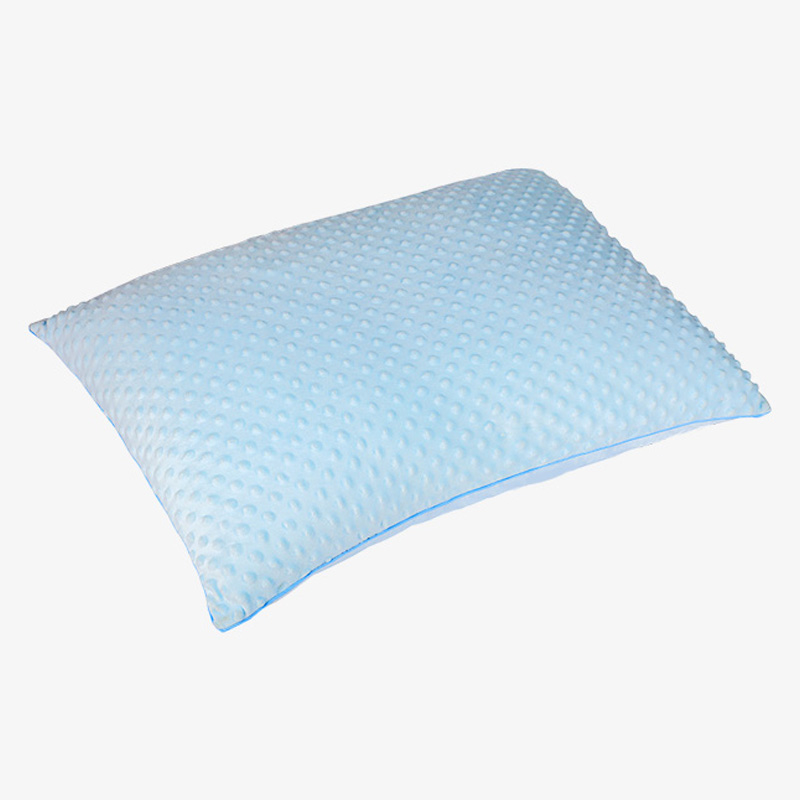Sleep is one of the most essential pillars of health. Nutrition and exercise are often emphasized, but without high-quality rest, our bodies struggle to repair, restore, and function at their best. And at the center of sleep quality lies one small but powerful accessory: the pillow. While mattresses get the spotlight, the right pillow is the unsung hero that can transform a restless night into a restorative one. Among the many types available today, the Polyester Cotton Pillow has steadily gained popularity, valued for its affordability, comfort, and practical design.
But here comes the important question: Is the polyester cotton blend pillow truly the right choice for you? This article takes a deep dive into the science, advantages, disadvantages, comparisons with other pillow types, and care tips for Polyester Cotton Pillows, so you can make an informed decision for your sleep health.
What is a Polyester Cotton Pillow?
At its core, a Polyester Cotton Pillow is made by blending two distinct fibers: synthetic polyester and natural cotton. These two materials are carefully mixed in varying ratios, commonly 50/50 or 65/35, to balance the best characteristics of each.
The inner filling is usually polyester, which is engineered into fine fibers or cluster shapes that mimic the loft of natural down. This filling provides a fluffy, cloud-like feel that supports the head and neck. The outer cover is often made from a polycotton fabric, which combines polyester’s durability and wrinkle resistance with cotton’s natural breathability and softness.
This union creates a pillow that is both practical and versatile, bridging the gap between luxury natural fiber pillows and fully synthetic options.
Why Polyester Cotton Pillows Became So Popular
The rise in popularity of the Polyester Cotton Pillow is no coincidence. Modern lifestyles require products that are easy to maintain, cost-effective, and adaptable. These pillows meet those demands and have become household staples across the world.
They appeal to families looking for budget-friendly bedding, students who need something simple and washable, and professionals who want comfort without the fuss of high-maintenance care. At the same time, they provide enough softness and support to make them suitable for a wide range of sleeping positions.
Benefits of Polyester Cotton Pillows
The advantages of choosing a Polyester Cotton Pillow go beyond affordability. They address the very needs of everyday sleepers.
Affordability
Perhaps the most obvious benefit is price. Compared to luxurious down or silk pillows, polyester cotton blends are far more accessible. This makes them a great entry-level choice for anyone who wants comfort without spending excessively.
Durability
Polyester is known for its strength. When blended with cotton, the fabric resists wear, fraying, and stretching. Similarly, the polyester filling resists collapsing and maintains loft longer than some natural alternatives.
Washability and Easy Care
One of the biggest selling points of a Polyester Cotton Pillow is how easy it is to wash. Most can be placed in a household washing machine and dryer, unlike down pillows that often require special care. They also dry faster than cotton or wool, which reduces the risk of mold or mildew buildup.
Wrinkle Resistance
The polyester component ensures that the pillow cover looks neat even after multiple washes, keeping your bedding tidy with minimal effort.
Balanced Comfort
The blend of fibers creates a balance: softness from cotton and resilience from polyester. The pillow is not overly plush, nor too rigid, making it versatile for different sleepers.

Potential Drawbacks of Polyester Cotton Pillows
Like any product, Polyester Cotton Pillows also come with downsides that may not suit everyone.
Breathability Concerns
Compared to 100% cotton or natural fiber pillows, polyester traps heat more easily. For hot sleepers or those living in warm climates, this could lead to discomfort.
Limited Moisture Absorption
Cotton absorbs moisture well, but polyester does not. The result is a pillow that may feel slightly damp or clammy for people who sweat during sleep.
Sensitivities to Synthetic Materials
Although polyester cotton blends are usually hypoallergenic, a small percentage of people may have skin sensitivities or discomfort with synthetic fibers.
Environmental Impact
Polyester is derived from petroleum-based plastics. Its production and disposal raise environmental concerns, making it less appealing to eco-conscious consumers.
Polyester Cotton Pillow vs. Other Pillow Types
To truly decide whether a Polyester Cotton Pillow is right for you, it helps to compare it with other popular pillow varieties.
Comparison of Pillow Types
| Pillow Type | Key Characteristics | Pros | Cons |
|---|---|---|---|
| Polyester Cotton Pillow | Soft, compressible, affordable blend | Affordable, durable, washable, hypoallergenic | Less breathable, may trap heat, less sustainable |
| Memory Foam | Dense foam that contours to the head and neck | Excellent support, pressure relief, neck pain reduction | Can trap heat, heavier, more expensive |
| Down/Feather | Natural fill, ultra-soft and luxurious | Lightweight, breathable, conforms well | Expensive, may cause allergies, requires professional care |
| Bamboo/Silk | Natural, moisture-wicking, smooth finish | Highly breathable, cool, hypoallergenic | Expensive, less durable, less supportive |
| Wool or Latex | Firm, resilient, eco-friendly | Excellent support, natural, long-lasting | Heavier, harder to clean, higher cost |
From this comparison, it’s clear that Polyester Cotton Pillows sit in the sweet spot of affordability and practicality, but they cannot match the luxury or cooling benefits of natural alternatives.
Who Should Consider a Polyester Cotton Pillow?
A Polyester Cotton Pillow may be an excellent choice for:
- Budget-conscious sleepers who want value for money without sacrificing too much comfort.
- Students or young professionals who need an easy-to-care-for option.
- People with mild allergies who want a pillow less likely to host dust mites compared to down.
- Busy families who value products that can be machine-washed and quickly dried.
Fiber Properties: Polyester vs. Cotton
To understand the behavior of a Polyester Cotton Pillow, let’s break down the differences between its core fibers.
Polyester vs. Cotton Fiber Comparison
| Property | Polyester | Cotton |
|---|---|---|
| Origin | Synthetic, petroleum-based | Natural, plant-based |
| Durability | Very high, resistant to stretching/tears | Moderate, can weaken with repeated wash |
| Breathability | Low, retains heat | High, allows airflow |
| Moisture Absorption | Very low, dries quickly | High, absorbs sweat and moisture |
| Wrinkle Resistance | Excellent | Wrinkles easily |
| Sustainability | Non-renewable, environmental concerns | Renewable, biodegradable |
This blend allows the pillow to borrow the best from both worlds: polyester’s resilience and cotton’s comfort. However, the compromises—particularly in breathability and eco-friendliness—are also important to acknowledge.
Tips for Choosing the Right Polyester Cotton Pillow
When shopping for a Polyester Cotton Pillow, here are factors to keep in mind:
- Filling type: Cluster-fill polyester resists clumping better than basic fiberfill.
- Thread count: A tightly woven polycotton cover feels smoother and lasts longer.
- Firmness and loft: Side sleepers may need firmer, taller pillows; stomach sleepers benefit from flatter, softer options.
- Size: Standard, queen, and king sizes are available; choose based on bed dimensions.
- Certifications: Look for textiles tested for safety, such as OEKO-TEX.
Care and Maintenance of Polyester Cotton Pillows
Maintaining a Polyester Cotton Pillow is relatively simple, but consistency is key.
- Washing: Machine wash on a gentle cycle with mild detergent.
- Drying: Low heat tumble dry with dryer balls to maintain fluffiness.
- Fluffing: Shake and fluff regularly to prevent clumping.
- Protection: Use a zippered pillow protector to guard against dust and allergens.
Proper care can extend the lifespan of a polyester cotton pillow to several years, making it an even more cost-effective choice.
Allergies, Dust Mites, and Hygiene
Unlike down pillows, which can harbor dust mites, the synthetic fibers in a Polyester Cotton Pillow are generally inhospitable to these common allergens. For those with asthma or dust sensitivities, this can be an advantage. Adding a pillow protector further strengthens the pillow’s defense against allergens and extends its cleanliness between washes.
Polyester Cotton Pillows and Sleep Health
A pillow is not just fabric and filling — it’s an integral part of your spinal alignment and sleep quality. The wrong pillow height or firmness can lead to neck pain, headaches, or disrupted sleep. While Polyester Cotton Pillows are versatile, they may not provide the targeted support of memory foam or latex.
That said, for many sleepers, especially those without chronic neck or back issues, polyester cotton pillows offer sufficient support and comfort for everyday use. Their affordability also makes it easier to replace them regularly, ensuring hygiene and freshness.
Conclusion: Are Polyester Cotton Pillows Right for You?
The Polyester Cotton Pillow is not just a budget-friendly bedding item — it is a practical solution for millions of sleepers who need a reliable, easy-to-maintain pillow. While it cannot match the cooling of bamboo or the luxurious softness of down, it delivers an unbeatable balance of comfort, affordability, and convenience.
If you are a budget-conscious sleeper, a student, a busy professional, or simply someone who wants a pillow that can be tossed into the washing machine without worry, the Polyester Cotton Pillow may be your perfect match.
In the end, your pillow is a nightly companion. Choosing wisely is not just about sleep but about investing in your health, energy, and well-being. And sometimes, the simple, dependable Polyester Cotton Pillow is exactly what you need to drift peacefully into dreamland.


 En
En  Français
Français Deutsch
Deutsch عربى
عربى








 +86-18268324012
+86-18268324012 +86-573-88798908
+86-573-88798908 Iris@zjmkn.com
Iris@zjmkn.com 233 Huashi East Road, Wuzhen Town, Tongxiang City, Jiaxing, Zhejiang Province, China
233 Huashi East Road, Wuzhen Town, Tongxiang City, Jiaxing, Zhejiang Province, China
